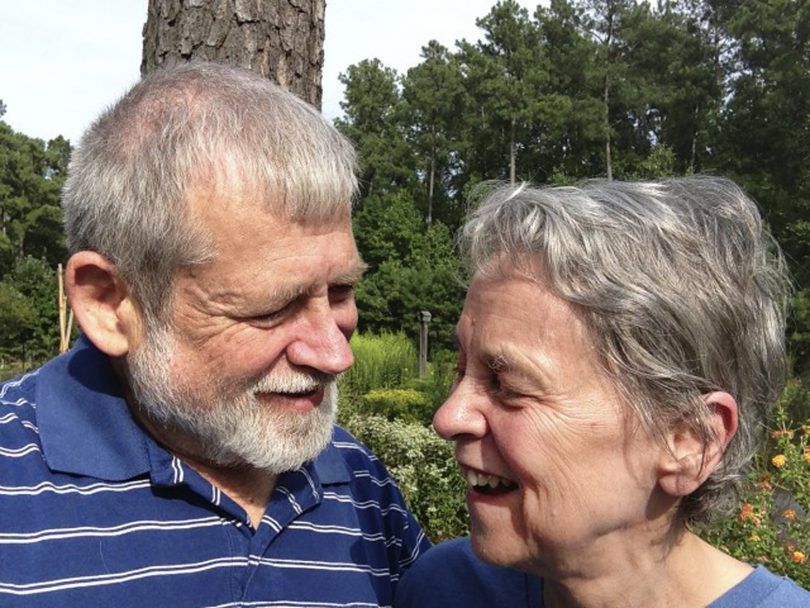John Broadwater has dinner with his wife Sharon every night.
He goes to the assisted living community where she resides, and he tells her about his day. He tells her how pretty she looks, and how much he loves her.
She’s his high school sweetheart, his wife of 49 years and the mother of his two daughters, and she doesn’t recognize him.
Sharon Broadwater, 71, has early onset Alzheimer’s disease. Her husband John is her primary caregiver and her personal advocate. He shares his story as a caregiver to educate other people and bring a greater awareness to what he calls a “horrible, horrible disease.”
“All of us kind of burn ourselves out almost, trying to make sure the loved one with the disease gets the care,” says Broadwater, using the analogy of the flight attendant telling you to put on your oxygen mask on first before helping others.
“When you really get into the caregiving, especially at an advanced stage, you start to appreciate that advice,” he says.
Broadwater, a retired archaeologist, began taking an active role as an advocate when his wife was officially diagnosed in 2007. Unfamiliar with the disease and forced into the role of a primary caregiver, he went searching for resources and found the Alzheimer’s Association Williamsburg chapter.
“I’m usually not that kind of person. I’m usually not that much of a joiner, but in this case, the Alzheimer’s Association was really helpful to me when I needed help,” he says.
Now, he is an active volunteer with the Alzheimer’s Association and participates in two support groups: A six-week course for newly diagnosed patients and their caregivers that offers them a chance to talk openly about the disease, and a monthly support group for caregivers.
“It’s just heartwarming to see these people facing it, and it’s kind of scary to know what they’re in for,” he says.
When his wife Sharon was diagnosed, it came early, and it came quick. Early onset Alzheimer’s disease typically affects people under age 65, and it’s often genetic.
Sharon was working as a biology professor at the College of William & Mary when the couple started noticing signs of dementia in Sharon.
“It was really horrible,” Broadwater says, explaining she was at the peak of her career and the Alzheimer’s forced her to retire early.
He tried keeping her at home for a while, retiring early himself, but after some time, he wasn’t able to care for her fully on his own, even with the help of caregivers, as she had become verbally—and even physically—abusive and had started wandering on her own.
“She was doing okay, and then she had a bad plateau down, and the next plateau down was horrible,” he says, adding he felt guilty having to place her in a memory care unit.
He says he used to have reservations about sharing his and Sharon’s story, but after learning he wasn’t alone in battle of Alzheimer’s, he opened up to try to help others and raise awareness—and money—for a cure.
In 2014, he took to Capitol Hill as part of the Advocacy Forum, where advocates and volunteers met with members of Congress to share their personal stories, educate them about Alzheimer’s disease and push for more funding towards research.
“We’re glad to see that Congress is starting to get it,” Broadwater says, adding there is still a huge disparity in funding between Alzheimer’s and other terminal diseases—Alzheimer’s disease receives an estimated $480 million dollars a year in funding while heart disease and cancer receive at least $4 and $6 billion annually, respectively, according to 2011 statistics from the National Institutes of Health Research Funding.
But Broadwater is happy progress is being made in the fight against the disease, perhaps in time for his two adult daughters, who have a chance of inheriting Alzheimer’s from their mother.
For now, Broadwater focuses on keeping his wife as comfortable as possible, remaining hopeful for a cure and for a few more years with Sharon, and helping others face this disease.
“The only good thing that could possibly come out of Sharon’s Alzheimer’s would be to share my experience and try to help other people,” he says. “[Becoming an advocate] turned out to be something that not only was helpful to others but it became therapy to me.”







